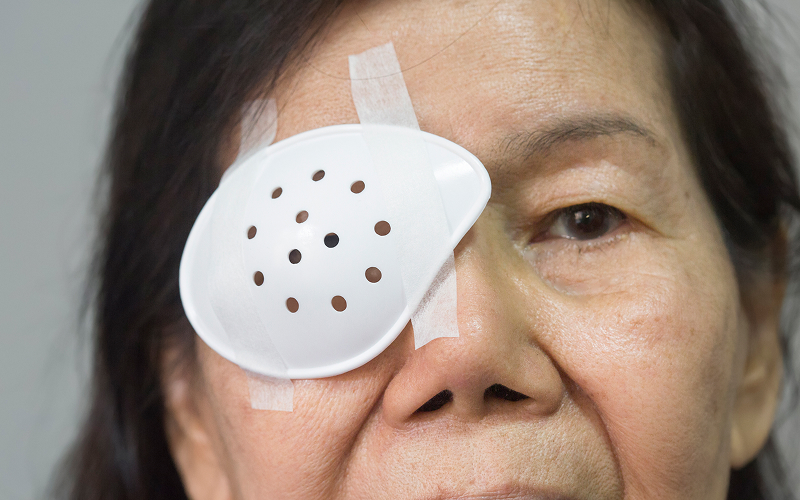Cataract surgery is one of the most common procedures to restore visual clarity, but temporary blurry vision can occur during recovery. While some fluctuation in sight is expected, following proper post-operative care helps minimise prolonged discomfort and speeds up visual stabilisation. The goal during this phase is to protect the healing eye, prevent complications, and maintain stable ocular health.
1. Follow Prescribed Medication Strictly
Patients are typically prescribed antibiotics and anti-inflammatory eye drops after cataract surgery. These play a critical role in preventing infection and controlling post-surgical swelling, both of which can contribute to blurry vision. It is essential to apply them exactly as directed, observing both dosage and schedule. Missing applications or stopping treatment prematurely can delay recovery and increase the risk of secondary complications such as corneal haze or increased intraocular pressure. Hands should always be washed thoroughly before administering drops to avoid contamination.
2. Avoid Eye Strain During Initial Healing
The operated eye is in a delicate state in the first week after surgery. Excessive screen time, prolonged reading, or other visually demanding tasks can cause strain, which may exacerbate blurry vision. Patients are advised to pace visual activities and take regular breaks to allow the eye to rest. Keeping sessions short and using adequate lighting can help reduce visual fatigue in cases where work or essential tasks cannot be avoided.
3. Protect the Eye from External Irritants
Post-operative eyes are more vulnerable to dust, wind, and airborne particles, which can irritate the cornea and prolong blurry vision. Wearing the protective shield provided after surgery, especially while sleeping, prevents accidental rubbing or pressure on the eye. Wearing sunglasses outdoors during the day helps minimise discomfort from light sensitivity and shields the eye from environmental irritants. Avoiding swimming pools, hot tubs, and direct exposure to water in the first few weeks is also critical to prevent infection.
4. Manage Swelling and Inflammation
Mild swelling of the cornea or retina can temporarily affect visual clarity after cataract surgery. While prescribed anti-inflammatory drops address this, lifestyle adjustments can further assist. Keeping the head elevated while resting can help reduce fluid accumulation. Applying a cold compress to the area around the eye (without direct contact with the eyeball) may provide relief from puffiness and irritation. It is necessary to avoid self-medicating with over-the-counter eye drops unless approved by the surgeon.
5. Maintain Good Overall Health During Recovery
Recovery from eye surgery is influenced by the body’s general healing capacity. Maintaining a balanced diet rich in vitamins A, C, and E, along with omega-3 fatty acids, can support eye tissue repair. Staying well-hydrated aids in maintaining ocular moisture, which reduces irritation and potential blurriness. Keeping these under control is essential for patients with chronic conditions such as diabetes or hypertension, as fluctuations can affect ocular healing and vision quality.
6. Monitor for Signs of Complications
While some blurriness is normal after cataract surgery, patients should be aware of symptoms that may indicate complications. Severe or worsening vision loss, intense pain, persistent redness, or sudden light flashes should prompt immediate medical attention. Early detection of issues such as infection, retinal detachment, or cystoid macular oedema can prevent long-term visual impairment. Attending all scheduled follow-up appointments ensures that healing progress is monitored and any problems are addressed promptly.
7. Gradually Resume Normal Activities
Physical activity should be reintroduced carefully after surgery. Bending over, lifting heavy objects, or engaging in vigorous exercise can increase intraocular pressure, potentially delaying visual recovery. Light walking is generally safe after the first day, but more strenuous activities should only be resumed when cleared by the surgeon. Gradual reintroduction of daily routines allows the eye to adapt without unnecessary strain.
Conclusion
Post-operative blurry vision following cataract surgery is often a temporary stage in the healing process. Patients can reduce the duration and intensity of vision disturbances by following prescribed medication schedules, protecting the eye from strain and irritants, maintaining overall health, and staying alert for warning signs. Consistent adherence to professional advice ensures an ideal recovery and supports long-term ocular stability.
Visit the National University Hospital (NUH) to receive guidance tailored to your eye recovery needs.

